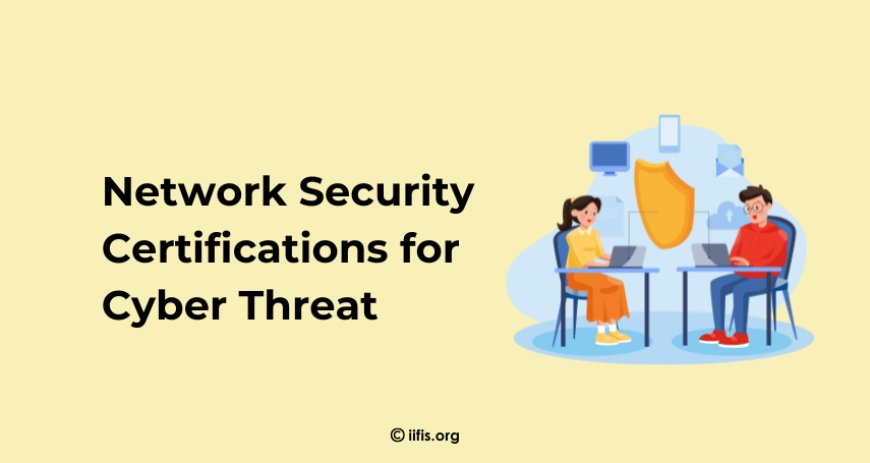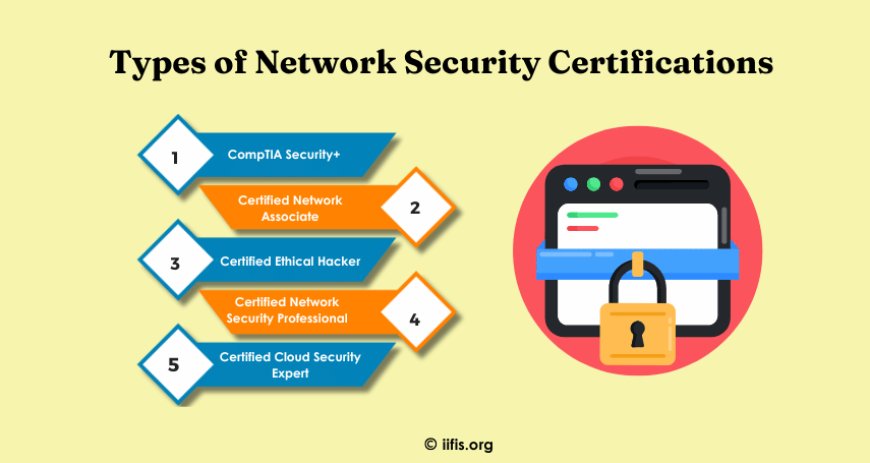Network Security Certifications for Cyber Threat Defense
Enhance your skills with Network Security Certifications to defend against cyber threats. Master tools like firewalls, VPNs, and encryption to protect networks effectively.

As a network security expert, my experience revolves around understanding and mitigating the various types of cyber threats that target network infrastructures. Over the years, I've worked with diverse tools and technologies, such as firewalls, intrusion detection systems (IDS), encryption protocols, and VPNs, to safeguard networks from attacks like DDoS, man-in-the-middle, and phishing.
In my career, I’ve also had the opportunity to work hands-on in real-world scenarios, configuring and securing network environments. This includes setting up secure communication channels, performing vulnerability assessments, and responding to incidents.
The Importance of Network Security in Cyber Defense
With the rise of online activity, networks have become prime targets for cybercriminals. From data breaches to ransomware attacks, the potential risks to network infrastructures are immense. As the backbone of any organization’s IT environment, network security is essential in preventing unauthorized access, data leaks, and downtime caused by cyberattacks.
-
Understanding Cyber Risks: Professionals with Network Security Certifications are trained to identify and understand various cyber risks.
-
Developing Mitigation Strategies: These certifications equip professionals with the skills to develop comprehensive strategies to mitigate security risks.
-
Essential Tools Knowledge: Certified professionals gain expertise in key network security tools like firewalls, VPNs, IDS, and encryption technologies.
-
Enhanced Cyber Threat Defense: The right expertise from certifications enables professionals to effectively protect an organization’s network infrastructure.
-
Improved Organizational Security: Certified professionals can significantly enhance an organization’s ability to defend against cyber threats and prevent potential breaches.
How Network Security Certifications Help Defend Against Cyber Threats
Network Security Certifications provide professionals with the tools to build robust security systems that protect against a variety of cyber threats. By gaining the expertise to set up firewalls, configure intrusion detection/prevention systems, and implement encryption protocols, certified professionals are better equipped to defend networks from attacks like:
-
DDoS (Distributed Denial of Service) Attacks: These attacks overwhelm a network with traffic, making it inaccessible to users. Certified network security professionals can set up systems to detect and mitigate DDoS attacks.
-
Man-in-the-Middle Attacks: Cybercriminals intercept communication between two systems, compromising sensitive data. Network security certifications provide the knowledge to implement secure communication channels such as VPNs and encryption.
-
Phishing Attacks: Phishing remains one of the most common attack methods. Security certifications help professionals recognize vulnerabilities in network protocols that can be exploited through phishing.
What Are Network Security Certifications?
Network Security Certifications are professional credentials that validate an individual's knowledge and skills in protecting networks and information systems. These certifications help individuals stay updated with the latest security trends and best practices, providing a clear understanding of how to protect the integrity, confidentiality, and availability of data.
These certifications are awarded by reputable organizations such as CompTIA, Cisco, and (ISC)2 and are recognized globally. They are specifically designed to equip professionals with the knowledge and tools necessary to defend against cyber threats targeting network infrastructures.
Types of Network Security Certifications
There is a wide range of Network Security Certifications catering to various expertise levels. Some of the most well-known include:
-
CompTIA Security+: A foundational cert covering network security, risk management, and cryptography.
-
Cisco Certified Network Associate (CCNA): Focuses on network fundamentals, IP services, and security.
-
Certified Information Systems Security Professional (CISSP): Advanced cert covering network security, risk management, and incident response.
-
Certified Ethical Hacker (CEH): Teaches ethical hacking to identify and fix vulnerabilities.
-
Certified Network Security Professional (CNSP): Specializes in securing network infrastructures from internal and external threats.
-
Certified Cloud Security Expert (CCSE): Focuses on securing cloud environments and managing cloud-based risks.

Each of these certifications addresses different aspects of network security, allowing professionals to specialize in particular areas of interest or career paths.
Why Pursuing a Network Security Certification Is Essential
As cyber threats grow more complex, the need for skilled professionals in network security becomes more urgent. By pursuing Network Security Certifications, you gain the knowledge and hands-on experience needed to identify, assess, and mitigate network security risks effectively. Here's why these certifications are essential:
-
Improved Job Opportunities: Many employers require or prefer candidates with Network Security Certifications as it shows commitment to professional development and demonstrates your expertise in the field.
-
Career Advancement: Earning a network security certification can open the door to higher-level positions and more lucrative salary opportunities.
-
Skill Validation: Certifications serve as a proof of your skills and capabilities, ensuring potential employers that you have the competence needed to secure their network environments.
-
Up-to-date Knowledge: With certifications, you stay current on the latest cybersecurity trends and network defense strategies, which is critical in a constantly evolving field.
The Hands-On Experience Gained Through Network Security Certifications
-
Practical Labs and Exercises: Certification programs often include labs that simulate real-world cyberattacks and defense scenarios.
-
Develop Critical Problem-Solving Skills: Hands-on experience helps professionals build the practical skills needed to solve complex network security issues.
-
Real-World Application: Candidates get the opportunity to apply theoretical knowledge in real-life situations, enhancing their ability to respond effectively to cyber threats.
-
Example of Cisco CCNA: The CCNA certification includes labs where candidates configure routers, switches, and firewalls to create secure network infrastructures, ensuring a deeper understanding of network security concepts.
-
Preparation for Real-World Roles: Practical training bridges the gap between classroom learning and actual job tasks, making certified professionals more job-ready.
The Future of Network Security and the Role of Certifications
As the internet of things (IoT), cloud computing, and 5G networks become more prevalent, the need for network security will only continue to rise. The future of network security will likely involve advanced technologies like artificial intelligence and machine learning to automate threat detection and response. Network Security Certifications will continue to evolve to cover these new technologies and prepare professionals for the challenges ahead.
For anyone interested in pursuing a career in cybersecurity or enhancing their existing skillset, obtaining Network Security Certifications will remain one of the most effective ways to stay competitive and defend against the evolving landscape of cyber threats.
























